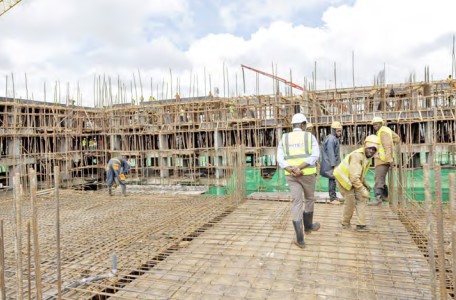 Kibra Affordable Housing Project/FILE
Kibra Affordable Housing Project/FILEThe hope for Nairobi’s urban poor to own affordable houses could remain a pipe dream.
This is after a report found that private investors own the majority of the affordable housing units in the city.
The report by the Nairobi County assembly’s land committee samples the Jevanjee and Pangani housing projects and show that the public owns a paltry fraction of the units, part of which are reserved for city politicians and officials.
For example, the Pangani affordable housing project has 1,562 unit but the public through the county only has 333 units.
The rest belong to the private developers that put them up.
The Pangani project consisted of 128 one-bedroom units, which were all owned by the county government, and have all been sold.
It had 248 two-bedroom units all owned by the developer, except two owned by the county, 32 of them have been completed and sold.
Of the 576 three-bedroom units, the developer owns the lion’s share at 373 units and 203 reserved for county.
The scenario replicates for the Jevanjee estate housing project that has 1,830 units.
It had 180 one-bedroom units with the county owning only five units.
he private developer owns the rest.
All the units have also been sold. The estate has 718 two-bedroom units and only 133 units are owned by the county, the rest belonging to the developer.
All of the units have been sold.
For three bed-room units, 318 were built and the county owns only 58. All have been sold.
The revelation by the committee could dash the hope of city residents to own some of the houses as majority do not only belong to private business moguls, but are also sold out.
When the concept of affordable housing was mooted by the Uhuru Kenyatta administration, it was billed as the solution to the sprawling slum problem in the country.
The public, through the government advanced incentives, including public land and funding for the projects with the hope that when done, they would be sold at affordable rates and the majority would be reserved for the public.
President William Ruto’s administration ramped up a public stake in the projects by introducing the housing levy tax, making it mandatory for salaried Kenyans to contribute to the construction.
The report dashes the hope.
The report also explains why the housing project in the two estates delayed in getting completed. Covid, floods, political unrest in the city and Ukraine war have been blamed for the delays.
“With regards to the current status of the project and the expected date of completion as per the contract, the committee was informed that the Jevanjee estate is at 46 per cent completion and it is expected that project is completed by September 2026,” it reads.
In this estate, the affordable housings will be ready by December 2025 but the market one will be ready in September 2025.
On the reasons for delay, the report says the county executive who appeared before it cited the fluctuating value of the shilling to the dollar which inflated the cost of the materials.
Response to the Covid pandemic also affected the man hours by workers as the measures instituted to contain it “resulted in disruption of supply materials and shortage of labour and the working hours were greatly reduced.”
“This to a great extent affected the programme for delivery of the project since targets could not be achieved as per plan,” report reads.
The report also said the title deeds for the land on which the projects sit could not be traced.
For Jevanjee, the land LR. No 209/5458 was in the name of Nairobi Bachelors Jevanjee Estate Limited which is the special purpose vehicle established to implement the project and the title was transferred to it through a lease.
But for Pangani, the whereabouts of the title deed could not be traced by the county executive in charge, the report said.
“The county executive reported that the whereabouts of the custody of the Pangani title deed was unknown as at the time of the meeting.”


















